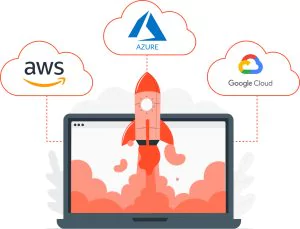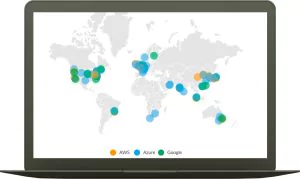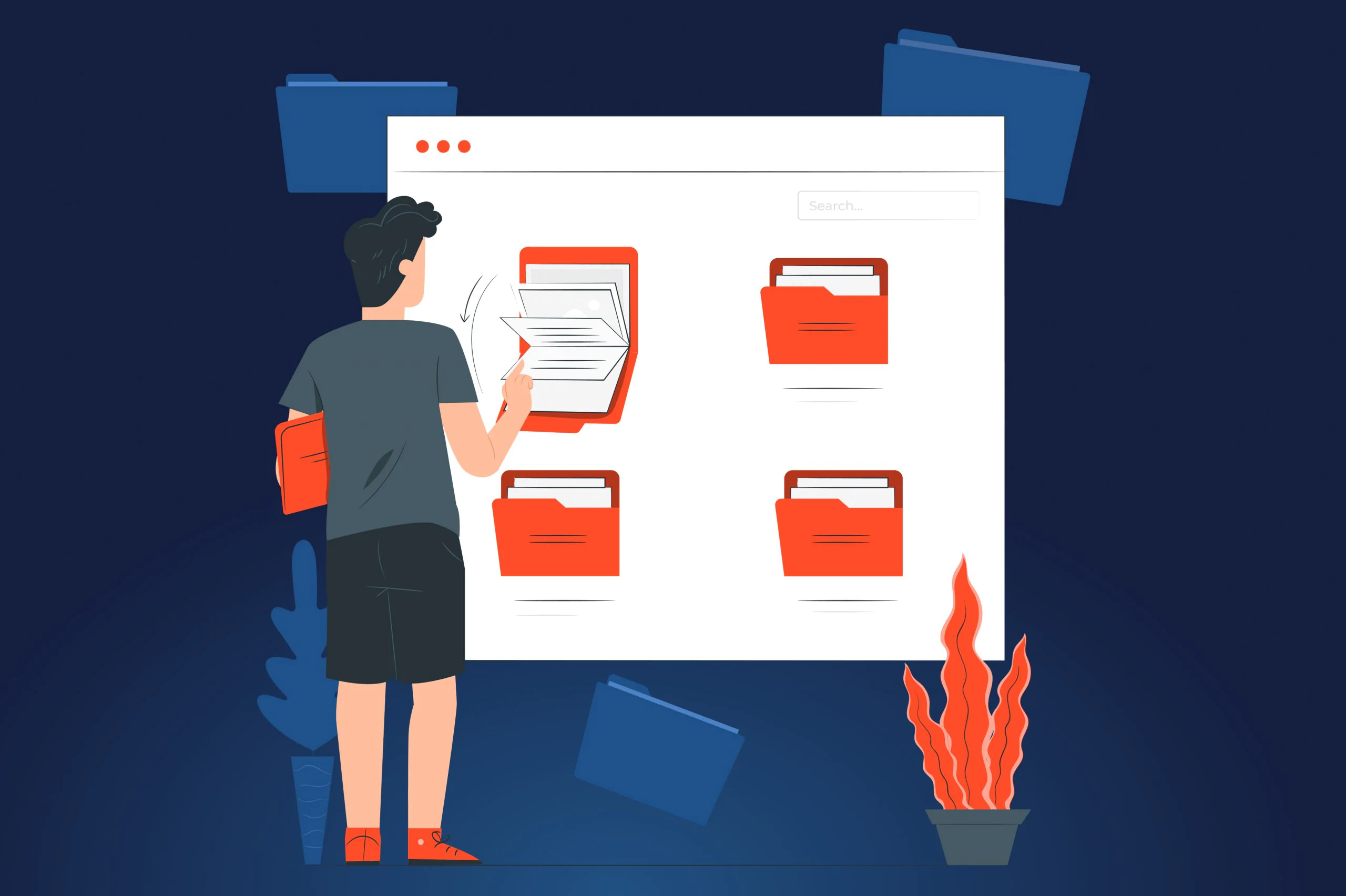As of now, Amazon Web Services (AWS) is recognized as the largest cloud computing provider in the world, delivering services to 33% of the cloud market globally. Other top vendors, Microsoft Azure and Google Cloud, grabbed 21% and 8% of the market share, respectively.
What’s the reason behind those vendors’ success? Why have the world’s largest companies opted for these providers to host their applications? Are there any weaknesses that you should be aware of? And lastly, how can you make a choice between them?
Below, the JatApp team introduces you to top cloud computing providers and compares them with each other for you to make a more informed decision when choosing a vendor for your project.
Meet top three cloud service providers
As we’ve mentioned there are three major cloud computing platforms that fiercely compete for being a number one provider. They are Amazon Web Services (AWS), Microsoft Azure, and Google Platform. Let’s briefly summarize each of them.
AWS
AWS is a cloud service provider created by (wait for it) Amazon. It’s considered as the most mature cloud provider, delivering a large number of services. AWS clients range from individual software engineers to governments. Some of the most famous customers are Netflix, Food and Drug Administration (FDA), Formula 1, Airbnb, and Coursera.
AWS is today’s undisputed leader among the cloud platforms. Let’s take a look at the growth in AWS annual revenue from 2013 to 2021.
Annual revenue of AWS from 2013 to 2021
Microsoft Azure
Microsoft Azure refers to the second-largest cloud computing provider with more than 200 services. The vendor focuses on making the shift to a hybrid-cloud or cloud environment hassle-free for many businesses. Azure caters the needs of big enterprises for the most part. ASOS, Center of Disease Control, Starbucks, and Renault are some examples of leading companies that rely on Azure in app development.
It’s worth noting that Azure doesn’t concentrate solely on Windows-based services. The cloud platform supports open-source languages, allowing anyone to build and maintain an application.
Google Cloud Platform
Google Cloud is AWS and Azure’s nearest competitor, offering more than 100 cloud services to its customers, including networking, computing, big data, and so on. The vendor boasts of its technical expertise in artificial intelligence (AI), deep learning, data analytics, and machine learning. The cloud service platform supports the applications of such industry giants as Spotify, Nintendo, Toyota, PayPal, Target, and more.
What are vendors’ key tools?
Competition among top cloud computing vendors revolves around such emerging technologies as machine learning (ML), artificial intelligence (AI), and the Internet of Things (IoT). The market leaders have started to expand their services to differentiate their offerings. Let’s see what key tools they’re providing to their customers these days.
AWS tools
- DeepLens
AWS offers DeepLens, an AI-fueled camera for building and implementing ML algorithms to work with object recognition and optical character recognition.
- Gluon
Among other AI-focused services, AWS introduces Gluon, a deep learning library created to make it easier for software engineers and non-engineers to develop and train neural networks, without getting familiar with AI programming.
- SageMaker
AWS SageMaker refers to a service that allows engineers and data scientists to develop, train, and deploy ML models. SageMaker makes it less challenging to prepare these models for training by choosing the best framework and algorithm for an app.
- Amazon Lightsail
Amazon Lightsail presents an AWS service used by software engineers that develop web applications and websites. It helps to quickly build a solution by offering managed databases, virtual private servers, load balancers, content delivery network, static IP addresses, SSD-based block storage, resource snapshots, and DNS management of registered domains.
Azure tools
- Cognitive Services
Azure offers a set of cognitive application programming interfaces (APIs) and AI services that assist in building intelligent applications. Notably, these services don’t require ML expertise. The only thing a developer needs to do is an API call to support the ability to speak, hear, see, understand, search, and speed decision-making of an application.
- Azure Backup
Azure Backup presents a service that enables users to backup data to the cloud. More specifically, it allows you to restore your data from Windows-based virtual machines (VMs) that are hosted on-premises and in Azure.
Google Cloud tools
- TensorFlow
Google Cloud Platform considers AI and ML as their biggest areas of expertise. TensorFlow epitomizes an open-source library for creating ML-powered apps. It has a wide range of programming interfaces for most languages required for deep learning projects.
- IoT Core
IoT Core can be defined as a fully managed service that lets users manage data retrieved from internet connected devices. It also allows you to automatically foresee when equipment requires maintenance and streamline its performance in real time.
What are vendors’ major pros and cons?
Each of the cloud service providers we discuss here has a number of pros and cons that can make them suitable for one project and absolutely inappropriate for another.
AWS pros and cons
Pros:
- Ease of use
AWS offers a user-friendly interface also known as the AWS Management Console. Usage doesn’t present any serious challenges as the vendor offers web service APIs for you to easily access the platform.
AWS UI
- A wide variety of services
AWS was initially designed for cloud computing and cloud storage services. Today, the platform extended to more than 70 services, including software, database, analytics, mobile, and networking.
- Unlimited mode for burstable performance instances
AWS can handle practically any IT need of an organization. Besides, businesses can grow and scale as they wish, without stressing out about disruptions in the service.
- Flexibility
The AWS infrastructure offers you various options on-demand , whether it’s a preferred web application platform, operating system, or programming language. AWS makes it trouble-free for a user to load any software or service they want in a virtual ecosystem.
Cons:
- Billing can become a headache
Despite all the benefits, AWS suffers from a major downside in its billing. For small business owners without profound technical expertise, AWS billing can be confusing and complicated. That’s why many businesses prefer working with a reseller.
- Elastic compute cloud limits
Amazon restricts the use of resources by region. A geographical location impacts the number of resources you can access. Moreover, the platform doesn’t allow new users to take advantage of many resources. It’s a protective measure created to prevent hackers from benefiting from its resources.
Microsoft Azure pros and cons
Pros:
- Security
When it comes to cloud services, security is of paramount importance. Microsoft Azure uses a Detect, Assess, Diagnose, Stabilize, and Close security approach, which enables the vendor to thoroughly protect clients’ data and prevent its loss.
- Scalability
Azure lets its users readily upgrade and remove the services when necessary. More importantly, they’re charged only for what they actually use, which significantly cuts costs.
Cons:
- Management can be necessary
As amazing as Azure is, it also comes with certain limitations. While Azure enables users to cut down costs for locally maintaining infrastructure and buying hardware, it still requires you to deal with data management. Azure doesn’t help with managing cloud-based data centers. This means that you’ll need to spend money to hire workers that can handle service monitoring and patching.
- Location can impact speed
Microsoft Azure’s performance differs from region to region. For example, the United States, Europe, China, India, and Australia are locations with a reliable and seamless performance. Local businesses there benefit from quick data access when needed. However, Africa, South America, and Canada suffer from decreased speed only because of their location.
Regions supported by AWS, Azure, and Google Cloud
Google Cloud Platform pros and cons
Pros:
- Lower cost
Google Cloud users enjoy relatively low prices for its services. More specifically, the vendor’s cloud services cost 25% less than its major competitor, AWS.
- Free trial
Google Cloud enables you to utilize 0.2 CPU/0.6GB RAM with 5GB cloud storage and 30GB disk storage free of charge without any time limits. This is quite enough for building a simple solution.
Cons:
- The lack of features
Compared to the other two vendors, the platform lacks a variety of features. While Google Cloud prides itself on having the highest performing infrastructure, the scope of its features remains rather limited.
- The lack of data centers
Even though the provider is relying on a cutting-edge undersea cabling system to penetrate foreign markets, it still lacks the data centers to ensure proper performance. Compared to AWS and Azure, Google offers fewer data centers.
Which one to choose?
As these three giants compete for cloud supremacy, you may naturally feel puzzled, being unable to understand which vendor fits your project best. The JatApp’s Web Team Lead puts together several recommendations to make it easier for you to choose the winner:
- If you’re seeking a provider with a global reach and enterprise-friendly services, AWS is exactly what you’re looking for. Also, AWS specializes in such features as monitoring, security, configuration, and so on. But be ready to spend a few hundred dollars more for the sake of these benefits.
- Google Cloud is a reliable vendor that provides the same infrastructure that Google deploys for its projects. Even though it’s way cheaper than AWS, it doesn’t have a large choice of services. Depending on your project needs, you’ll have to decide whether Google Cloud is the right choice for building your solution. Still, by opting for this platform, you can benefit from open source support and DevOps expertise.
- Azure aims to win the battle for market leadership by delivering similar services as AWS, but for lower prices. Azure is a perfect fit for big projects, as it allows you to configure the infrastructure in alignment with the needs of your software. Besides, it has open source support and is known for its development and testing tools.
Bottom line
AWS is today’s market leader in terms of service and capacity. However, Google Cloud and Microsoft Azure are also quickly evolving and successfully competing with AWS. Azure stands apart with its increased security and scalability, while Google has a strong focus on cost-efficiency.
In light of that, many enterprises are searching for multi-cloud strategies to enjoy the advantages offered by each cloud vendor without restricting themselves to a single vendor. No matter which cloud platform you choose, you need to take into account unique needs of your project as well as your business.







